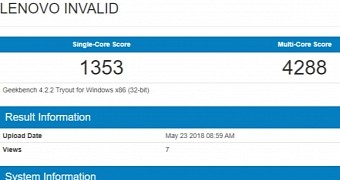Microsoft has launched Windows 10 on ARM with much fanfare, saying that Always Connected PCs, which are devices running on Qualcomm Snapdragon chipsets, are the future of mobile productivity.
While the first-generation Always Connected PCs have enjoyed limited success due to limitations like reduced performance, Microsoft is getting ready for an overhauled lineup projected to launch later this year.
The first such device was recently spotted on Geekbench by German site WinFuture, and by the looks of things, it’ll tackle the biggest issues of its predecessors.
First and foremost, the original Always Connected PCs were powered by an optimized version of the Snapdragon 835 mobile chip, the same one that is currently installed on flagship smartphones like the Samsung Galaxy S8.
Possible launch in the fall
The upcoming series, however, will come with Snapdragon 845, the upgraded chipset also installed on high-end mobile devices, including the successor to the Galaxy S8 called S9.
The spotted Always Connected PC is manufactured by Lenovo and is codenamed Europa, and according to the cited source, would bring substantial performance improvements.
With 8 cores running in turbo mode at 3 GHz, this new hardware configuration can boost performance by as much as 50 percent, making these devices significantly faster.
There are no ETA specifics available at this point, but earlier this year, people familiar with the matter revealed that the next-generation Always Connected PCs would launch a few months after the Snapdragon 845 chip makes its debut on mobile devices. It’s thus believed that Microsoft could introduce new laptops in the fall, with Lenovo to be one of the partners supporting this second generation.
The bigger challenge for Microsoft will be to bring more companies on board, as the limited success of the original series might make many OEMs reluctant to invest in Windows 10 on ARM devices.

 14 DAY TRIAL //
14 DAY TRIAL //